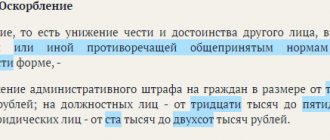The problem of insulting and spreading false information about others is a universally recognized act of anti-social nature. To legally resolve issues related to slander, you can file a statement of slander to the police, the sample of which is not fixed. If complicated situations arise related to factors of slander on the part of officials or other persons, it is possible to file a statement of slander with the prosecutor's office, the sample of which is similar to the form of application submitted to the police.
Filing a libel claim in court
| Download sample documents |
You can punish a slanderer by filing a criminal complaint. The article is criminal and has the nature of a private accusation. This means that a criminal case can be initiated directly only after the target of the crime applies to the court. The application should be filed in the magistrate’s court at the defendant’s place of residence. It must indicate:
- – name of the court;
- – information about the applicant – full name, place of residence;
- – information about the alleged criminal, his place of residence, contact details (if they are known to the applicant);
- – information about the legal representative, including information about the power of attorney;
It is necessary to describe what the disseminated information discredits honor, dignity and reputation consists of. It is also necessary to identify the sources in which false information was published. These can be printed publications or electronic resources.
The task is made easier if the victim knows who exactly is distributing such information. But there are cases when information is published anonymously, under a pseudonym or on the Internet, from so-called “fake” accounts. Then, before going to court, you need to submit an application to the police so that they initiate a case and carry out a series of operational search activities aimed at identifying the criminal.
To do this, you will need to contact your Internet service provider and obtain information about the location of the subject who published the defamatory information. When identifying the slanderer, the police convey the information to the victim and he has the right to file an application in court and initiate a case. However, the investigator is also given the opportunity to initiate a case on similar grounds and conduct an investigation.
The process of proving defamation is complicated in that the applicant will have to disclose confidential information about his personal and business connections, as well as involve other persons in the process as witnesses who may not want to attract unnecessary attention to themselves.
| You can easily solve any legal problems with the help of lawyers registered on the site - you set the price for completing the task (consult, draw up a claim, file a complaint, etc.), and the lawyers submit applications for your task, you just have to choose the best one. Leave a task: |
The court considers the case in the presence of the parties, establishes the degree of harm caused to the honor and dignity of the citizen. The moral component of the case is taken into account. If the applicant's arguments are confirmed in court, the suspect may receive a fairly large fine.
Formation of the evidence base
If you find yourself a victim in relation to whom unpleasant rumors or speculation have been illegally spread, a citizen must first try to collect a convincing evidence base, the quality of which will determine the decision on the complaint. This is extremely relevant if, as a result of such an act of another person, the victim experienced severe stress, as a result of the unrest his health sharply deteriorated, or he suffered financial losses (for example, due to reputational losses), compensation for which he wants to achieve forcibly.
Important! The refusal to initiate a criminal case still leaves the victim the right to file a civil claim and seek compensation for moral and/or material damage.
To protect your reputation and good name, you will need to create the following evidence base:
- prepare documents that indicate that the information being disseminated is not supported by any facts. And the more such materials there are, the easier it will be to initiate a criminal case and obtain monetary compensation for losses;
- indicate the presence of a motive for committing such a crime. In most cases, the person who commits such an act has a personal interest and does it for some purpose (for example, out of personal enmity, to lure clients to himself, etc.).
Use of testimony
The presence of witnesses can largely determine the outcome of a case when the task is to bring the offender to justice for disseminating knowingly false information. Their testimony will play a big role in court, where they will be invited to testify. Witnesses can be friends, neighbors, relatives or work colleagues who were direct participants in the conflict or its involuntary spectators.
If the incident occurred on the street or in a public place where the victim had no acquaintances or friends, it is necessary to try to find witnesses and negotiate with them to testify. Due to the fact that this is not always realistic, in such situations it is better to immediately exchange contact information with passers-by in order to be able to turn to them for help and support upon immediate request.
When it is not possible to attract witnesses
The victim should not neglect to use available technical means to record the facts of the spread of slander. This can be done using an audio player, voice recorder or mobile phone and then attach such material to the complaint as evidence of an offense.
If unreliable information about a citizen has become available to the public through a video/audio recording or a written source, then a linguistic examination can be carried out to attach the expert’s opinion to the compiled document. With its help, it will be possible to identify the guilty person and achieve his punishment even in the absence of witnesses.
Responsibility and punishment
The type and extent of liability for libel is determined by specific article 128.1 of the Criminal Code of the Russian Federation.
The article identifies five different types of crime, differing in their composition and responsibility:
- information is disseminated that affects the honor and dignity of a citizen, his reputation;
- public slander (through the media, at public demonstrations of works, as well as speeches);
- committing slander while using a position in the service;
- false information is disseminated about the victim having a disease that is dangerous to others, or false information about a citizen committing a crime of a sexual nature is transmitted;
- fictitious data are disseminated about the commission of a crime by a citizen (classified as grave or especially grave).
Important! The material component of the sanctions provided for such a criminal act as libel is quite serious - in extreme cases, the fine reaches five million rubles. . The Criminal Code of the Russian Federation also has a separate provision defining liability for perpetrators who slander officials (Article 298.1)
The Criminal Code of the Russian Federation also has a separate provision defining liability for perpetrators who slander officials (Article 298.1).
Punishment in this case awaits persons who have spread slander against judges, prosecutors, jurors, inquirers, investigators and bailiffs in connection with the conduct of a trial, preliminary investigation, execution of a sentence or other court decision.
Who can legally answer for libel? Criminal legislation determines that any person over 16 years of age (subject to his legal capacity and full sanity) can act as a subject of a crime.
Sample statement of personal insult.
What the punishment for libel will be is determined by five different circumstances (according to the number of individual parts of Article 128.1 of the Criminal Code):
- Part 1. Establishes liability for simple slander - the fact of transmitting false data regarding a citizen if they damage his reputation or hurt his honor (dignity). For such actions, a fine is provided - up to 500,000 rubles or in the amount of the culprit’s six-month income. Another type of punishment is compulsory work. The maximum duration that can be awarded is up to 160 hours;
- part 2. Public form of slander. When criminal acts are contained in speeches, demonstrations of works, and disseminated through the media. The culprit under this part faces a twice as large fine - up to a million rubles (or the amount of annual income). The second option for sanctions is mandatory work. Here their duration was extended to 240 hours;
- part 3. A crime is committed by a person when he abuses his official position. Penalties are also doubled and imposed in the amount of up to two million rubles (as an option - income for a period of up to two years). The duration of work for this part is also longer - up to 320 hours;
- part 4. This type of crime is formed if false information is disseminated against the victim about the presence of a disease that poses a danger to other people, or about the commission of a crime of a sexual nature. Penalties for this part reach up to three million rubles (or the amount of income for a period of up to three years). They may also assign a mandatory type of work lasting up to 400 hours;
- part 5. This composition is the most serious. We are talking about slander against a person accusing him of a serious (especially serious) criminal act. Such actions threaten the offender with a fine of up to 5,000,000 rubles. (as an option – in the amount of income for a period of up to three years). The second type of punishment is compulsory labor lasting up to 480 hours.
In order to avoid imposition of punishment for libel, the parties have the opportunity to reconcile during the consideration of the case in court.
Another possible option for excluding liability is to prove the fact that the person was unaware that the information he transmitted was unreliable.
Attention!
What is the crime
Creating and disseminating deliberately false information about facts from the life of another person with the aim of harming him is the brief essence of the crime. It should be distinguished from defamation, which is a mixture of fiction and truthful information, while slander is deliberately false.
To make punishment for slander possible, the information must be:
- false;
- cause moral suffering, humiliation, and infringement of rights.
For example, wanting to take a higher position, a colleague spreads rumors that the person occupying it was caught in theft or theft, and cases of theft of material assets of employees began to appear in the company. In such a situation, we can talk not only about moral suffering, but also about real damage caused by dismissal.
Due to the popularization of the Internet, distributing any information is not difficult. This method is actively used in quarrels between spouses, friends and other people who have certain social connections with each other. However, it is difficult to find acceptable evidence of the dissemination of such information.
Representatives of law enforcement and other agencies that protect the law stand apart. There is a special article for slander and insult against them.
Special attention should be paid to insults. It can often be confused with slander. However, if the information was transmitted directly, then the offender can only be punished under the Code of Administrative Offences.
Filing a libel report to the police
To carry out preliminary investigation activities, i.e. In order to identify the guilty person who disseminated slanderous information, it is necessary to contact the nearest police station with a statement.
A sample statement of defamation to the police can be found on the Internet, or you can ask the police officer on duty.
Before contacting the police station, you must ensure that you have evidence that confirms the criminal act committed. The human rights defender must be convinced that the illegal act actually took place.
The Criminal Code provides for criminal liability of the applicant in the event of a knowingly false report against another person. Therefore, the application must contain an appropriate mark confirming the fact of familiarization with Art. 306 of the Criminal Code.
When accepting the application, the police officer must also explain the applicant’s right to voluntary reconciliation with the one who spread the slander.
In addition to filing a complaint with a law enforcement agency about slander, the injured party has the right to file a claim in civil proceedings to compensate for the moral damage caused by the slander.
Since criminal libel results in humiliation of a person, from which he begins to experience stress, even mental disorders and deterioration of health.
Therefore, to substantiate the damage caused by the dissemination of slanderous information, it is necessary to attach documentation that will indicate the incurrence of additional costs for restoring health.
The amount of moral damage is established by the injured party depending on the degree of suffering, but the court has the right to reduce or increase it.
In 2022, for the dissemination of slanderous information, the maximum punishment for the main offense is provided in the form of performing compulsory work for up to 160 hours. You can get away with minimal punishment in the form of fines. But for aggravated slander you can be punished with a fine of up to 5 million rubles or compulsory labor of up to 480 hours.
Having become a victim of libel, you should not think about whether you can sue for libel; you must immediately take specific measures, which are described in detail above.
Video: Criminal punishment for libel
ugolovnyi-expert.com
Contacting the prosecutor's office
The powers of the prosecutor's office include:
- verification of complaints against police officers who conducted investigations into slander, and analysis of the legality of the decisions made;
- approval of the indictment and support of the prosecution during the trial.
It is not advisable to submit an application for prosecution for the dissemination of false information discrediting the moral character of a citizen to the prosecutor's service.
The explanation is that prosecutors:
- do not take part in civil proceedings for compensation of damages;
- do not investigate notifications of violations;
- do not replace the police and the court, which are authorized to make decisions on the facts of individuals filing complaints of libel and punish criminals;
- do not monitor compliance with the law and are not empowered to take response measures against those responsible.
Prosecutor's officers accept statements from victims and forward them to the subordinate organization. No more than 5 days pass from the moment the document is registered. Therefore, to save time, it is better to contact the police station or court directly.
How to compose correctly
It is necessary to draw up a statement regarding the fact of slander correctly so that the receiving body does not return the document to the applicant, leaving it without consideration. There is no specially developed template in legislative acts in accordance with which a complaint must be filed. On the territory of our country, not only Russians, but also citizens of other countries, including Ukraine, Belarus, Kazakhstan and others, can complain about violations of their rights.
Regardless of where the application is submitted, it must begin by indicating the full name of the body to which the applicant is sending the document. In the case when it is the police, you must indicate the unit you will be contacting and the details of its chief. The same rules must be followed when going to court or the prosecutor's office.
It is not necessary to write a statement to the police at home, that is, you can make it right at the police station. In this case, the employee who accepts the application will tell you how to write it correctly or provide a sample document. Compilation is based on the following data:
- Writing down the specific circumstances under which the dissemination of data that does not correspond to reality occurred. You need to indicate the method that was used by the perpetrator to humiliate your dignity.
- It is considered necessary to note that the data that has been distributed is not valid. The applicant must indicate that the data is defamatory and discredits him as a person.
- If you are complaining about a specific person, then the document must indicate his details, including last name, initials and address. When a complaint is written against a group of people, information about each participant is indicated.
- At the end of the form there must be the date of compilation and the signature of the applicant.
- A note is made that it is possible to hold the author of the complaint accountable for false denunciation. The person must sign to acknowledge these provisions.
Important! When submitting an application to a judicial authority, it is necessary to comply with the document form established by law. . In this case, it is necessary:
In this case, it is necessary:
- the name of the judicial body that will review the material is indicated;
- the details of the applicant and the respondent are entered;
- the circumstances of the incident are described in detail;
- the evidence base on which the accusation will be based is indicated;
- if compensation for moral damage is necessary, appropriate evidence must be involved.
The complaint must be accompanied by a document confirming payment of the state fee.
Evidence in the case
To bring the culprit to justice, it is necessary to prove in court the spread of slander. The following will help you cope with this task:
- testimony of witnesses (neighbors, acquaintances and any other citizens who received false information);
- recordings made using a voice recorder or video camera;
- SMS messages;
- paper correspondence;
- publications in the media or on various websites (in the latter cases, screenshots will be required).
It is often necessary to organize a linguistic examination of widespread information.
Which authority to contact?
Let's figure out which institutions a citizen whose reputation has been illegally damaged can turn to.
To the police
It makes sense to contact the internal affairs bodies in the following cases:
- The person who committed the crime is not known to the victim and investigative and search activities are necessary to identify him. Once all the details of the incident have been established, the information will be sent to the courts.
- If the form of slander has additional characteristics, for example, false information was disseminated by a person using his official position, the victim must also contact the police. Since elements of defamation increase the possible punishment, such proceedings must be thoroughly investigated.
libel reports to the police
To court
Libel cases are heard by magistrates' courts because they are classified as private accusations. The claim should be filed in the court at the place of the incident.
It is worth noting that the plaintiff must be aware of the personal data of the defendant, since the procedure for filing a claim assumes this.
When filing a claim, you must remember that, according to the law, the statute of limitations for minor crimes is two years. After this time has passed, litigation is doomed to failure.
Where to contact
Every Russian citizen is endowed with the rights to protect his moral character, untarnished name and personal dignity. Contacting the police or a magistrate's court will help stop slanderous attacks and bring the perpetrator to justice.
Libel is a private crime. Therefore, the victim himself must initiate the accusation procedure by submitting a written statement to human rights authorities. Employees are required to accept and properly record the official document. Punishment in criminal cases falls within the competence of the courts.
Police investigate the following situations:
- if necessary, investigative measures to identify the culprit;
- if the crime falls under parts 2-5 of Art. 128.1 of the Criminal Code of the Russian Federation.
In standard cases, criminal proceedings are conducted by a magistrate. District offices make decisions on civil cases providing for compensation for moral damage caused by slander in monetary terms.
How to prove slander and punish the slanderer instructions
Victory over a slanderer is a difficult matter, but (with the help of lawyers) quite real. True, only if there is reinforced concrete evidence. Without them, it is impossible to win the case.
The main premise of the defense in court is evidence of the direct intent of the slanderer. That is, it will be necessary to prove that the distributor was well aware of the falsity of the information being disseminated and consciously desired the consequences of its dissemination.
How to fight?
Instructions for victims of slander
- Don't rush into battle unless you have evidence. Don't waste your nerves and time in vain.
- Get the support of a lawyer. He will advise you on how to competently collect evidence, write a statement and defend yourself further.
- Collect evidence: paper copies certified by a notary, audio and video materials, and, if available, testimony of witnesses.
- Seek a psychological and linguistic examination of libel on the Internet and in the media. This examination will help determine whether the materials contain signs of slander. If available, the expert opinion can be attached to the application.
- Where to contact? If you are going to bring the slanderer to civil liability, then the statement, written strictly according to the form, should be written to the district court (if the court’s decision is negative, we go higher - to the world court). If it’s criminal, then go to the police. However, the possibility of simultaneously submitting applications to both authorities cannot be ruled out. It is also possible to consider the application at the Prosecutor's Office.
- In addition to the requirement for a refutation, a citizen has the right to demand compensation for moral damage (in both civil and criminal proceedings). The consequences of slander in the form of moral and physical suffering will also have to be proven. The final amount of compensation is determined solely by the court.
- Time limit for consideration of the case in court. From the date of submission of the application to the office, it is 1 month.
- The statute of limitations for this crime (libel) is 3 years. There is no statute of limitations for filing a claim for compensation for moral damages.
Is it realistic to punish a slanderer?
If earlier slander was considered only an administrative offense, today the slanderer may well become a defendant in a criminal case. The main difficulty in this process for the plaintiff is to prove the fact of dishonest accusations.
If there is evidence, there is every chance to punish the offender with at least a substantial fine and demand compensation for moral damage.
The main thing is without emotions!
Consult lawyers and believe in yourself! Still have questions? Just call us:
St. Petersburg 8 (812) 627-14-02; Moscow
How to sue for libel
It is important to know that the statute of limitations for an administrative violation is 2 months from the date of the incident, and for a criminal violation – 2 years.
- The name of the court to which the plaintiff is applying is written in the header of the document. It is recommended to indicate it without abbreviations, in full.
- Below are the details and contact information of the plaintiff and defendant. It is recommended to include addresses (if possible), telephone numbers, email, etc.
- After compiling the header, we move on to the main information of the claim. Here you should write basic information about what happened. To be more convincing, you should provide as much detailed information as possible. Describe the circumstances of the libel, indicate in detail the damage caused to you. It is advisable to indicate dates and, if possible, times. It would also be a good idea to provide information in which one could read the motive of the one who slandered you.
- After describing the situation, you should indicate what you want to receive from the defendant. For example, the amount at which you estimate moral damage. But when specifying the amount, it is important that it is justified and justified. If possible, you can rely on excerpts from the article of the Criminal Code for libel, as well as excerpts from the Civil Code of the Russian Federation.
- The next step is to describe in detail all the information, based on which you can confirm the fact of slander. Here you should provide all the evidence you have - up to the indication of witnesses to the slander, photographs, video recordings, etc.
- After this, indicate a list of documents confirming the slander and other information that you attach to the statement of claim.
- At the very end, the date of filing the claim and the signature of the plaintiff are indicated.
What are the penalties for disseminating false information?
For giving false testimony, punishment is provided, which can be in the form of a fine or correctional labor. What punishment will be applied in any given case will depend solely on the type of libel and the manner in which it was spread. Let's look at the main types of punishment:
- A statement to the police about libel is filed when one person decides to tarnish the honor of another. Then the punishment may be in the form of a fine in the amount of 500,000 rubles.
- Defamation that occurs at a public level is punishable by a fine of 2,000,000 rubles.
- When a person tries to accuse another of illness or rape, a fine of 3,000,000 rubles may be imposed.
- If false information is given with the aim of accusing a person of a particularly serious crime, then the fine can reach 5,000,000 rubles.
Lately this article has hardly been used. Libel is a difficult crime to prove, so basically all controversial issues are resolved within the framework of civil law relations. But still, you shouldn’t allow yourself to be offended, so a person who tries to slander another in order to get his own benefit from it must definitely be punished.
How to calculate material losses
As a rule, the person who has suffered from libel suffers material losses. The offender is obliged to compensate them. To do this, a civil claim for material damage is added to the initiated case. The amount of the claim must be justified. Therefore, at the moment when a decision is made to protect rights with the help of law enforcement agencies, you need to set a goal - to obtain financial documents that ensure success in court.
These include:
- An invoice, a cash receipt from the clinic, if the citizen sought advice from privately practicing psychologists, psychotherapists and other specialists.
- Prescriptions, receipts from pharmacies for drugs prescribed to alleviate the consequences of a traumatic situation, relieve psychosomatic disorders, bills for treatment in a sanatorium, and so on.
- Other documents confirming monetary expenses associated with a damaged reputation, for example, expenses for moving to another locality, for publishing a refutation in the media, and so on.
- Legal expenses, such as attorney fees.
It is important that all financial costs are directly related to the consequences of the crime. .
What's the result?
The purpose of contacting law enforcement agencies is to punish the offender with action and rubles: he will receive a criminal record and pay a fine for slander and insult.
When contacting the authorities, the applicant can count on the following results:
- initiation of proceedings by the court or police;
- if a statement is received by the police, its employees conduct an investigation and forward the materials to the judge for further consideration and sentencing;
- the court considers the received materials; in addition, you can file a civil claim for damages;
- sentencing;
- appeal or execution of a judicial act.
You can always sue for libel. But the process must be carefully prepared for the case to be won.
Claim of libel
Before turning to the competent authority to protect your rights, it is necessary to adequately assess the situation: whether a person is subject to criminal liability for libel, whether there is evidence of a criminal attack.
In some cases, you will need good advice from a criminal lawyer who can correctly classify a criminal act. A statement is a reliable way to protect your honor and dignity. Read on to find out where to file a libel claim.
Where to apply?
- Upon the commission of a criminal act, the victim has the right to contact the police. The application can be submitted at the nearest branch. After checking the information specified in the application, an appropriate decision is made: to initiate a criminal case;
- refuse.
- In addition to contacting the police, another procedure is also provided - writing a statement of private accusation of libel directly to the judge in the magistrate's court. Drawing up a claim must comply with procedural norms and rules, so most often victims resort to the services of a lawyer.
- A complaint about the dissemination of false information about you, that is, a statement of slander, can also be filed with the prosecutor's office. The authority has the authority to hold the slanderer accountable without trial. In some cases, the prosecutor will represent the interests of the victim in court and act as the state prosecutor.
We’ll tell you further about how to correctly write a sample statement of slander to the police, as well as a statement of claim to the magistrate’s court.
How to compose?
Any written appeal must begin by indicating the body to which the demand for protection of rights is sent.
- If this is the police, then the specific unit is indicated in the introductory part, as well as information about the head of the station.
- If this is a magistrate's court, then a specific judicial area is indicated. After which you need to write information about yourself as a victim (full name, residential address, contact phone number).
More details on how to file a complaint to the prosecutor's office, incl. a lawyer will talk about libel in this video:
https://youtube.com/watch?v=8oYpvn1WCRc%3Ffeature%3Doembed
An appeal to a law enforcement agency can be completed directly by the employee who receives it, so you should not be afraid of the correctness of its preparation.
At certain points, the attendant will tell you what points you should pay attention to.
- The descriptive component contains data about the fact of dissemination of fictitious information about you (their content), and specifically the methods of reporting to third parties must be indicated.
- After which the fact is indicated that this information does not correspond to the real state of affairs, and also discredits you as a person (evidence that your honor and dignity have been discredited, that this has brought you strong moral experiences).
- If there is a certain citizen suspected of transferring such information to other persons, information about him (full name, contact information) is indicated. If a group of people is suspected, then everyone must be identified.
- The appeal must have a signature and date of preparation.
- The article on false denunciation must be explained to the applicant, and a corresponding note must be made about this.
The statement should be concise and meaningful, without spatial descriptions. you can here.
Statement of slander to the police (sample)
The statement of claim is characterized by a clearly established form. In a private accusation it is necessary to indicate:
- data of the magistrate's court (name);
- information about the applicant and the respondent (the entire group of persons);
- description of the circumstances of the criminal act (method of transmitting information to third parties, content, place and time);
- evidence base for the case (list of witnesses, documentation, technical means, etc.);
- if compensation for moral damage is required, then supporting evidence (papers, witness statements) must be attached.
Submitting an application to the court is preceded by payment of the state fee, the receipt for which must also be attached. The claim must contain a requirement to hold the person liable for libel, indicating specific provisions of the law (Criminal Code, Code of Criminal Procedure). claim can be made here.
Statement of libel to the magistrates' court (sample)
Submission order
The application is submitted directly to the police department or prosecutor's office, or to the office of the magistrate's court.
- The police department issues a special document - a notification coupon, indicating the acceptance of the application.
- The magistrate's court also issues a paper, according to which the originals of the submitted documents are later returned.
ugolovka.com
Criminal liability
The liability implied for reporting knowingly false information is described in Article 128.1 “Slander” of the Criminal Code of the Russian Federation. Relatively recently, such cases were considered within the framework of civil proceedings.
Let's look at what sanctions can be applied to persons convicted under this article at the present time:
- For slander without additional characteristics, the convicted person is punished with a fine of five hundred thousand rubles or compulsory work in the amount of 160 hours. An example of such a crime is the disclosure of defamatory information orally or via electronic messages.
- Spreading rumors on a large scale threatens the violator with a fine of up to a million rubles or 240 hours of work. This category includes slander disseminated on television, radio or the Internet, on resources equivalent to the media.
- If slander is spread using the official position of the violator, he may face fines of up to 2 million rubles or labor service for up to 320 hours. For example, the head of an institution slanderes his former employee to the management of competitors, and this prevents the victim from finding a new job.
- If a person slanderes a non-existent dangerous disease of the victim, he faces punishment in the form of a fine of up to 3 million rubles or compulsory work of 400 hours. This part of the article implies the same punishment for misleading others that the victim has committed unlawful acts of a sexual nature.
- Dissemination of knowingly false information about the actions of the victim, which can be qualified as grave and especially grave crimes, is punishable in the most severe manner, provided for in Article 128.1 of the Criminal Code of the Russian Federation - a fine of up to 5 million rubles or 480 hours of work.
Fines are collected from the wages or other income of convicted persons within a certain period of time. The larger the fine, the more time the citizen is given to pay the amount of money.
It is worth noting that money can be recovered from the distributor of slander for moral damage caused or (if business reputation was damaged due to the dissemination of false information). To do this, it is necessary to attach the corresponding statement of claim to the case.
What is libel: legal framework
The concept of slander is spelled out in Article 128 of the Criminal Code of the Russian Federation. Slander is the dissemination by any means of information, knowingly false, that discredits the honor and dignity of another person, and undermines his reputation. Deliberately false information is a lie, and the one who disseminates this information initially knows that it is false.
The law establishes whether it is possible to write a statement for libel and under what conditions this is done:
- a slanderer aged 16 years or older is brought to justice;
- the article for libel is applicable only to individuals;
- When a slanderer deliberately slanders, he knows that he is spreading lies about another person, and does this with the aim of harming him (his reputation).
The culprit will be prosecuted for libel if he spread it in one of the following ways:
- on radio or television;
- published in the media or on the Internet;
- shown in a TV show and other sources;
- told at least one person;
- slander is reflected in public reports, characteristics, statements that are addressed to an official or a group of people.
These conditions are classified as aggravating circumstances:
- libel in public expression (mass media, reports, speeches, literary works);
- the victim was reported as having committed a criminal offense (grave, especially grave, sexual in nature);
- use of official position to spread slander;
- if the victim was spoken of as a spreader of a dangerous disease that threatens others.
Submission order
The complaint is filed directly at the police department or prosecutor's office. When applying to a judicial authority, you must submit an application to the office. If a law enforcement agency provides the opportunity to submit an appeal via the Internet, this can be done on the official website of the relevant department.
In any case, the receiving person must provide the applicant with a document confirming receipt. In the police this is a coupon; in the prosecutor's office, as a rule, the officer who received it makes a note on the second copy of the complaint, which remains with the author. The court issues a receipt indicating the documents transferred. If it is necessary to return them in the future, issuance without this paper cannot be made.
https://youtube.com/watch?v=v7x83I-51yE%3Ffeature%3Doembed
How to properly file an application to court
If you want to punish your offender for slander, you should immediately contact the district court. In fact, a crime such as libel, Article 128.1 of the Criminal Code of the Russian Federation, is considered after filing a statement of claim, but in this case it is quite difficult to do without the help of a specialist. You can submit an application to the police, where employees will be required to review it and become familiar with all the nuances. After which, within 10 days, a decision is made whether to initiate a criminal case or refuse to initiate it.
The application must be very competent, so it is best to entrust its preparation to a lawyer. If you need to punish the offender, but without a trial, you can send a statement to the prosecutor's office. An employee of the prosecutor's office will be able to familiarize himself with the case and act as a defender of the interests of the injured party in court.
Application consideration period
If an application is filed with the police, a decision on the application is made within three days. If the circumstances of the case are complex, the period is increased to 10 or 30 days. The statute of limitations applies to minor crimes. If the victim was slandered more than 2 years ago, he will not suffer any punishment.
If the case is filed in court, 7 days after registration of the application, the process is started (the alleged criminal is summoned to court, acquainted with the case, find out who else to call and hear as defense witnesses). There is no statute of limitations for cases brought to court. An exception is cases regarding information disseminated in the media (such cases have a statute of limitations of one year from the date of publication).






